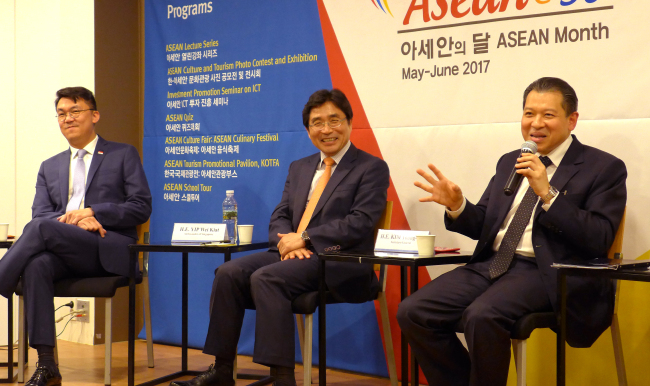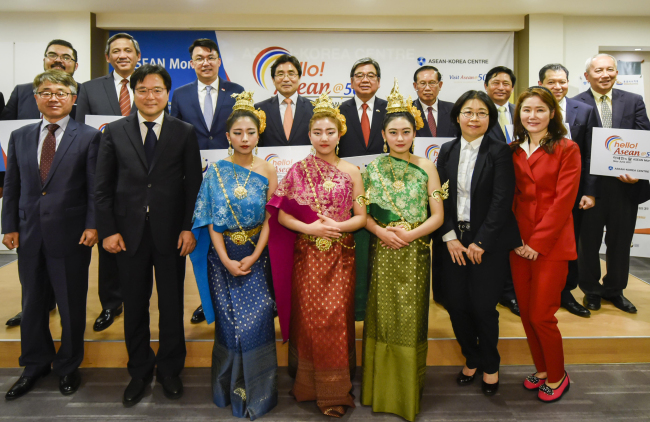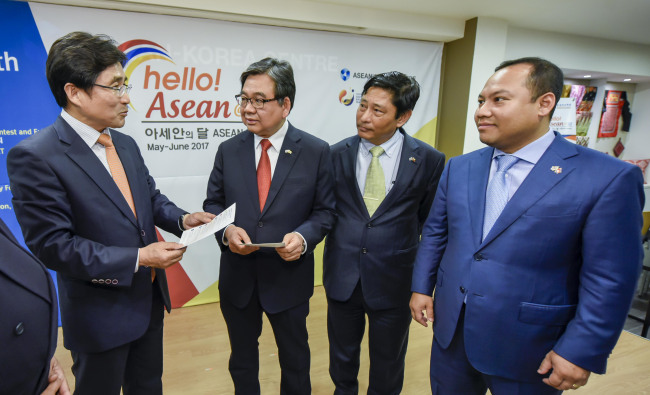The ASEAN-Korea Center has organized various cultural events throughout May and June, which have been designated as ASEAN Months to mark the 50th anniversary of the Association of Southeast Asian Nations this year.
To uplift and strengthen bilateral relations between ASEAN and the Republic of Korea -- strategic partners since 2010 -- this year has been named the ASEAN-ROK Cultural Exchange Year.
The intergovernmental organization will host academic lectures on the regional bloc’s diverse cultures at its office in Seoul until June 22, an investment promotion seminar in the information and communications technology sector at Coex in Seoul from May 24-27 and a quiz event for young people at the center on May 27.
 |
From left: Singaporean Ambassador to Korea Yip Wei Kiat, ASEAN-Korea Center Secretary-General Kim Young-sun and Thai Ambassador to Korea Sarun Charoensuwan (Joel Lee/The Korea Herald) |
The center will also hold a culinary festival and tourism promotional pavilion as part of the Korea World Travel Fair at Coex from June 1-4, a photo exhibition at the center, Coex, Ansan Arts Center and Seoul Metropolitan Library from June 1 to Aug. 31 and a school tour program at Ansan Arts Center on June 15.
The institute was established in 2009 to mark the 20th anniversary of bilateral sectoral dialogue partnership, and is mandated with promoting two-way exchanges in trade and investment, tourism, cultural and people-to-people relations.
As part of the series of seven lectures, professor Park Jang-sik of Busan University of Foreign Studies will speak about the influence of Hindu-Buddhist culture and legacy; professor Kim Ye-kyoum will lecture on Hindu culture and heritage in the Indonesian context; and professor Bae Yang-soo will give a talk on Vietnam’s Confucianism.
Professor Kim Dong-yeob will explain the legacy of European colonialism on Southeast Asian cities; professor Lee Mi-ji will expound on the border dispute between Cambodia and Thailand near the Preah Vihear Temple; and professor Jea Dae-sik will discuss Islamic culture and heritage in Southeast Asia.
For more information, visit www.aseankorea.org/eng.
 |
ASEAN diplomats, Korean professors, students and journalists and members of the ASEAN-Korea Center at the launching ceremony of the ASEAN Month at the center on Thursday (ASEAN-Korea Center) |
“Many Koreans view ASEAN in biased ways based on their experiences with migrant and illegal workers in Korea. But their perceptions do not see the whole proper picture of ASEAN,” said the center’s Secretary-General Kim Young-sun at the launch ceremony for ASEAN Months on Thursday.
Kim was a former career diplomat and Korean ambassador to Indonesia from 2011 to 2014,
“We need to be more open-minded and tolerant of differences. We need to accept others as they are. To make it happen, I want to emphasize the ASEAN spirit of ‘unity in diversity,’ which has allowed the bloc to move toward integration while acknowledging differences.”
Partnership among different stakeholders is also crucial, Kim added, citing public and private sectors, civil society, academia and mass media.
Singaporean Ambassador to Korea Yip Wei Kiat said Koreans’ understanding of ASEAN and its cultures has generally been skin-deep, based on their cursory, slapdash visits to tourist sites.
“Due to the success of Hallyu, many Southeast Asians know a lot about Korea, but the exposure of ASEAN among Koreans is much less,” he said. “I would advise Koreans visiting ASEAN countries to not only hit the popular tourist sites, but have a more in-depth look at the lives of locals and their cultures, and also develop ties with them.”
 |
ASEAN-Korea Center Secretary General Kim Young-sun (left) and ASEAN ambassadors (ASEAN-Korea Center) |
Noting that cultural differences between and within ASEAN countries are great, the envoy said Korean businesses can make long-term investments there to better understand local markets and tap unexplored opportunities.
Korea’s Ministry of Foreign Affairs last year in Busan began construction on the ASEAN Culture House, a four-story building covering a 2,640-square-meter area in the city’s Haeundae beach area, which is expected to be completed later this year. The agency will promote two-way cultural exchanges with items donated from each ASEAN member state encompassing traditional and modern culture, religion and various other aspects. The venue will also hold musical concerts, performances and gatherings for Southeast Asians in and around the city.
“People-to-people ties are the strongest foundation for strengthening country-to-country relations,” said Thai Ambassador to Korea Sarun Charoensuwan.
“Our leaders and policymakers have recognized this importance, and have prioritized cultural exchanges through the ASEAN-ROK Cooperation Fund,” he added, referring to the annual $5 million program funded by Seoul that conducts various projects in development cooperation, technology transfer, human resources development, people-to-people ties and academic and cultural exchange.
The regional body of 10 nations is celebrating its diverse and unique tourism through the “Visit ASEAN at 50” promotional campaign, which showcases 50 festivals and cross-border travel experiences. Last year, more than 6 million Korean tourists visited Southeast Asia, comprising one-third of the country’s 18 million overseas travelers.
ASEAN is Korea’s second-largest trade partner after China and top investment destination, with bilateral trade reaching nearly $120 billion last year and expected to top $200 billion by 2020. Since the ASEAN-Korea Free Trade Agreement came into full force in 2009, economic cooperation has expanded to comprehensive areas including investments and services.
By Joel Lee (
joel@heraldcorp.com)








![[Exclusive] Hyundai Mobis eyes closer ties with BYD](http://res.heraldm.com/phpwas/restmb_idxmake.php?idx=644&simg=/content/image/2024/11/25/20241125050044_0.jpg)
![[Herald Review] 'Gangnam B-Side' combines social realism with masterful suspense, performance](http://res.heraldm.com/phpwas/restmb_idxmake.php?idx=644&simg=/content/image/2024/11/25/20241125050072_0.jpg)
